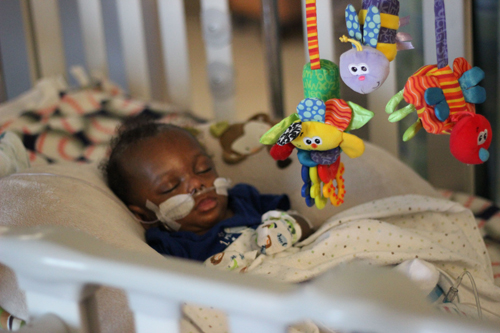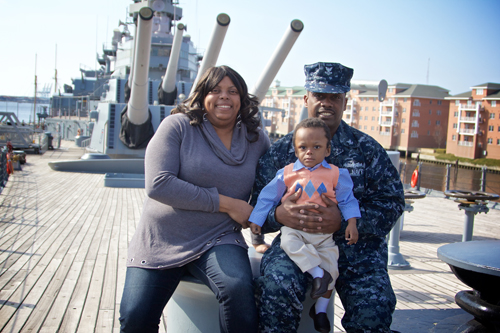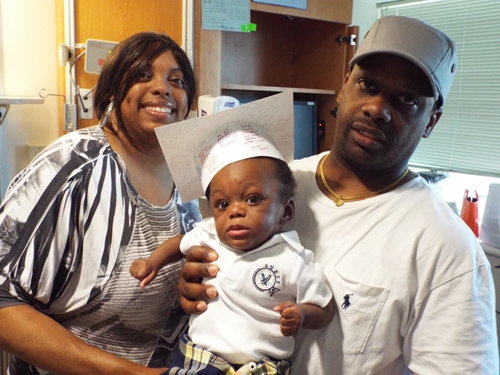NICU deploys special care for Corwin.
Corwin Whitaker’s mother, Octavia, was only 27 weeks into her pregnancy when a routine checkup revealed her blood pressure had become high enough to kill her and her unborn son. She was immediately admitted to Sentara Norfolk General Hospital, where it soon became clear that in order to give mother and son the best chance of survival, doctors would have to deliver Octavia’s baby three months early.

“It was so frightening,” says Octavia. “And when I realized I would have to go through it all alone, panic set in.” Corwin’s father, IC2 Petty Officer Corey Whitaker, was halfway around the world in Japan, deployed with the U.S. Navy. Octavia had no other family close by. “I was so grateful when Dr. Jamil Khan, a neonatologist from CHKD, came to my bedside and explained how they would be ready and waiting to care for my baby as soon as he was born.”
On July 4, 2013, 13 weeks ahead of schedule, Corwin was born by emergency C-section at SNGH. He weighed just 1 pound, 3 ounces – barely more than a baseball. Within minutes, the team from CHKD’s neonatal intensive care unit rushed him to CHKD through an adjoining corridor. Their most critical concerns were Corwin’s severely underdeveloped lungs, a heart defect, and a perforation in his intestine that developed soon after birth requiring immediate surgery. But he was alive and so was Octavia.
In addition to neonatologists, nurses, nurse practitioners and many other pediatric specialists, the CHKD NICU staff is comprised of professionals whose roles go far beyond the medical care of premature and sick babies and whose services are often provided at no cost to patients. Chaplains, social workers, lactation consultants, parent support coordinators, case managers, parent educators and child life specialists provide a comprehensive support system for the entire family. Corwin’s NICU support team immediately mobilized to bring his father home on leave from Japan, something they coordinate with the Red Cross on a regular basis for deployed parents of critically ill children.
It would take three days for Corey to complete the 7,000 mile trek to see his newborn son. He and Octavia spent every day of his week-long leave together by Corwin’s bedside, holding each other, but unable to hold their tiny baby. “It was completely overwhelming for us both,” says Corey.
After Corey returned to Japan, Octavia was alone once again. “It was hard. I cried a lot, but the people at CHKD were there for me. They became my family,” Octavia says.
The NICU team supported Octavia as Corwin endured two abdominal surgeries before he was a month old and during his eight weeks on a ventilator while his lungs matured. Like most parents of preemies, Octavia experienced a roller coaster of ups and downs, progress and setbacks, in the first months of Corwin’s life.
Octavia vividly recalls the most frightening night of Corwin’s journey – an episode of extreme respiratory distress which occurred on September 27. “Corwin seemed very tired all day. Later that night his breathing became labored – and with every breath he was crying. As I stood at his bedside, his eyes suddenly rolled back in his head and his lips turned blue. I burst out crying. All I could think was that my baby was dying in front of me, and there was nothing I could do,” Octavia says.
The CHKD medical team immediately responded to Corwin’s breathing crisis. “Within seconds, it seemed there were 20 people at his bedside -- doctors, nurses, the respiratory team. They all knew just what to do to save him.”
As time passed, Corwin began to make steady progress. But after her difficult pregnancy, Octavia’s health was still faltering. The importance of having Dad home with his family was more critical than ever.
“Our CHKD social worker told us about the Navy’s Exceptional Family Member program,” says Octavia. The program could allow Corey, who was four months into a two-year deployment in Japan, to be reassigned based on his family’s critical medical circumstances. “The social workers got all the paperwork together, and the doctors wrote letters,” Octavia says. “Everyone at CHKD was very involved in getting Corey back home.”

In December, almost five months after Corwin’s birth, Corey received a humanitarian reassignment from the Navy and arrived home to finish his tour of duty in Norfolk. “I met my son for the second time. Now he could see me, hear my voice, and best of all, I could hold him,” Corey says. “After that, everything seemed to fall into place.”
Corwin’s heart defect healed on its own. His lungs progressively got bigger and stronger. He began laughing and playing. But his intestinal issues and feeding intolerance continued to be a major challenge.
“Gastrointestinal issues in premature babies like Corwin require some of our longest hospitalizations,” says Dr. Khan, who also serves as medical director of the CHKD NICU. “The tiny digestive systems of babies born so early are very sensitive, and requiring surgery on their intestines makes their care even more complex. Nutrition is essential for growth and development, so when that is compromised, many other complications can arise.”
Since birth, Corwin had been nourished through a combination of intravenous and tube feedings. An ileostomy, a surgically created opening in the abdomen, had been created to move waste out of his body. At 7 months, an age when full-term babies are beginning to experiment with first foods, Corwin was going through a third abdominal surgery. Dr. Robert Kelly, a CHKD pediatric surgeon who had performed his previous surgeries, would complete the repair of his intestines, allowing him to drink from a bottle for the first time.
“Corwin’s first bottle was less than a quarter of an ounce, and it took him over an hour to get it down,” remembers Octavia. “Babies are born knowing how to suck, but if they don’t use the instinct, they can lose it. It took him two months to figure it out again and even longer for his system to adjust and keep his feedings down.”
Finally, exactly one month shy of his first birthday, Corwin was able to leave the hospital for the very first time in his life. “It was the best day ever,” says Octavia. “We didn’t even care when he kept us up at night!”

Like most NICU babies, Corwin’s journey didn’t end with his discharge. To help premature babies stay on trackdevelopmentally, CHKD has a comprehensive follow-up program in place. Corwin attends physical therapy twice a week, occupational therapy once a week and speech therapy once a month. He is closely monitored by his pediatrician, Dr. John Harrington, along with pediatric specialists in cardiology, gastroenterology and pulmonology.
“I can’t imagine being cared for better than we were at CHKD,” says Octavia, who is now a member of CHKD’s NICU Family Advisory Council and provides support and guidance to other NICU parents. “CHKD is a family we will always be apart of.”